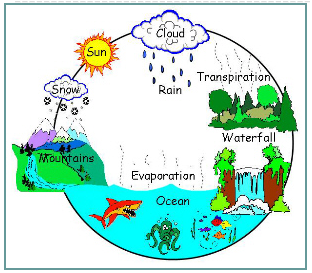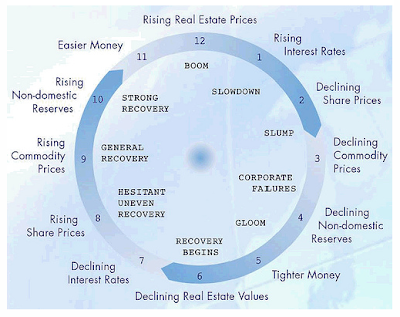

The concept of Economic Cycles, which are sometimes referred to as Business Cycles, is a theory that attempts to explain changes in economic activity that vary from a long term growth trend as observed in a developed market economy. Factors considered in defining an economic cycle include growth of GDP, household income, employment rates, etc. Economic Cycles are divided into two main categories: booms and recessions. Booms are associated with a strong economy, while recessions are characterized by below-trend economic growth. The National Bureau of Economic Research (NBER) is considered the authoritative source in the US that reports the dates of the peaks and troughs that quantify Economic Cycles. NBER defines economic cycles a bit differently than Economic Cycle Theory.
Rather than booms and recessions, it classifies the economy as being in expansion or contraction. Expansion is when several pieces of economic data are improving, and contraction is a decline in the same data. These definitions focus more on the movement of data, whereas the boom/recession definition only refers to the data's position relative to historical averages.
The basic idea behind economic cycles is that they're more than just mere fluctuations in economic activity and are significant enough to be "widely diffused over the economy.". A short term decline in economic activity has historically been observed to be followed by a short term gain in economic activity. Observed over longer periods, the highs and lows average out to form the trend, or average, economic growth rate. The Economic Cycles Theory holds that although this trend growth rate is subject to change, it has remained relatively steady in the past, thus theoretically indicating the general rate of economic growth that we can expect to see in the mid-term future. No attempt is made by Economic Cycles Theory to describe economic activity during extended periods of decline, only growth.
Booms and Expansions
Key features of an economic boom:
* Above-trend GDP growth
* Higher disposable incomes
* Less unemployment
Recessions and Contractions
Key features of a recession:
* Below-average GDP growth. The historical definition of a recession is when the economy has two consecutive quarters of negative growth. Usually by the time the official reports come available to identify a recession the market has already priced in the recession. Most recessions have a time span of 18-24 months.
* Lower disposable incomes
* Higher unemployment rates
* Decreased consumer spending is caused by the above mentioned conditions, lower disposable income from inflationary pressures, higher commodity prices such as oil, or food sources. The less spending can lead to higher unemployment. Many times this first shows in the retail sector. The three items mentioned, basically, will manifest itself on the other and snowball into a recessionary period.
Economic cycle repeats all the time just like water cycle repeats all the time. Our economy cycle never fails, boom and recession are part of the cycle just as transpiration, evaporation and rain are part of water cycle. It is just because most people like it when the economy booms and hates it when the economy is in recessions. Some people gain millions during recessions because recession gives them the chance to buy great businesses at very low prices and let them expand their businesses at the lowest cost. Survival of the fittest. A good example, Airasia is expanding now when other airlines are shutting down. I like Airasia (sound management and cheap).
Some people like rainy days and some people people like sunny days. Some people like recessions and some people like booms. In the end, it is which side you are taking. I think the most important thing is that we must get ourselves ready for each of the situations.



errrrrrrrrrrrr... okay. there is a difference and i definitely prefer the first one.
ReplyDeleteVery good blog. I am subscribing you. Good work
ReplyDelete